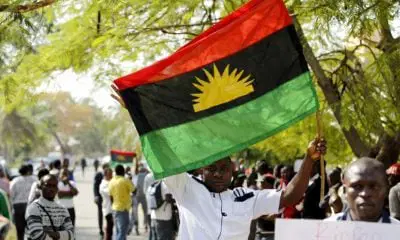 Advertorial
Advertorial
The Court of Appeal in Abuja has reserved judgment on an appeal filed by the Indigenous People of Biafra (IPOB), which challenges the Federal Government’s designation of the group as a terrorist organization.
This designation was originally issued by the late former Chief Judge of the Federal High Court, Justice Abdul Abdu-Kafarati, on September 15, 2017.
In its appeal, IPOB is asking the appellate court to nullify the previous ruling, which prohibited its activities in Nigeria.
 Advertorial
Advertorial
The ruling was based on an ex parte motion filed by former Attorney General Abubakar Malami (SAN), representing the Federal Government, which declared all IPOB activities illegal, particularly in the South East and South-South regions.
Justice Abdu-Kafarati concluded that IPOB posed a threat to national security, dismissing arguments that the group, not being a registered entity in Nigeria, could not be legally pursued by the Federal Government.
He noted that IPOB’s claims of being registered in over 40 countries did not absolve it from legal accountability under Nigerian law.
 Advertorial
Advertorial
The court ordered the Attorney General to publish the proscription order in two national newspapers and an online platform.
In a subsequent ruling on January 22, 2018, the court rejected a motion from IPOB challenging the validity of the proscription order, which the group claimed was obtained improperly.
On Thursday, a three-judge panel led by Justice Hamma Barka adjourned the appeal, marked CA/A/214/2018, after both the Federal Government and IPOB submitted their final arguments.

Mr. Oyilade Koleosho represented the Attorney General, while Chukwuma-Machukwu Umeh (SAN) appeared for IPOB.
Additionally, detained IPOB leader Nnamdi Kanu sought to join the case as an interested party.
IPOB argues that the former Attorney General misrepresented facts in his affidavit to the court.
The group also claims that the proscription effectively labels over 30 million Igbo Nigerians as terrorists.
 Advertorial
Advertorial
In its appeal, IPOB asserts that Justice Abdu-Kafarati made legal errors and caused a miscarriage of justice when he ruled that the statutory requirement for President Muhammadu Buhari’s approval, under Section 2 (1)(C) of the Terrorism (Prevention) (Amendment) Act, 2013, was fulfilled based on a memo issued by the Attorney General on September 15, 2017.
The appeal contends that Justice Abdu-Kafarati did not adequately consider evidence presented to establish that IPOB is not a violent organization.
 Advertorial
Advertorial
The group’s submission states, “Proper findings of facts built on a meticulous evaluation of affidavit evidence placed before the court below will resolve whether the activities and characters of the appellant… meet the threshold definition of terrorism acts.”
IPOB further argues that its activities are peaceful, involving demonstrations with placards, and lack any history of violence, contrasting sharply with groups that have engaged in violent acts.
Umeh requested that the court grant the appeal, asserting that IPOB was denied a fair hearing.
 Advertorial
Advertorial
Koleosho denied these allegations and urged the court to dismiss the appeal.
After hearing arguments from both sides, the panel reserved judgment and announced that it would communicate the date for the decision to the parties involved.

















